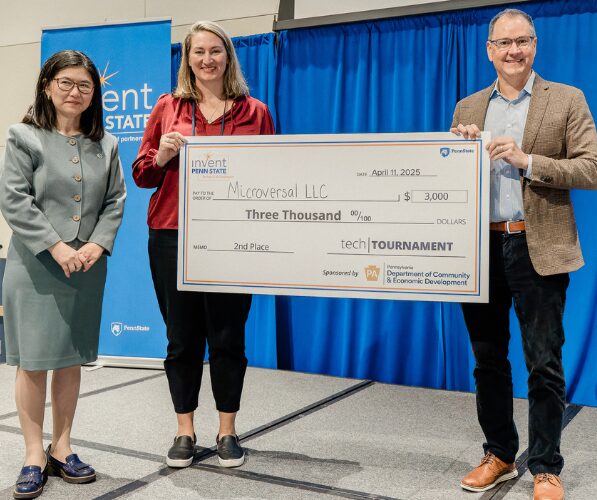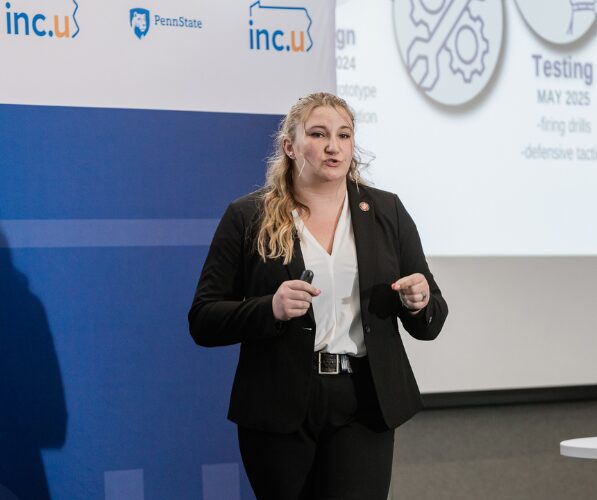Success Story
Penn State research startup NeuroXR completes I-Corps National Teams program
In biomedical research and surgical training environments, precision is key – both in the usage of instruments to complete the study or training, and the resulting data and measurements. When a biomedical researcher is conducting a medical study by dissecting lab mice, less than 1 mm of precision can be the difference between doing the study properly or improperly. The same is true for a medical student learning to do complex medical procedures using cadavers.
Currently, there is no formal data collection system for either of these environments, which makes reproducing data and evaluating a surgical student’s preparedness and precision difficult.
NeuroXR, a Penn State research startup, hopes to standardize these procedures using wearable sensors so biomedical researchers and surgical trainees can gain objective datasets.
“The state of the art right now in these environments is to monitor activity using cameras, and so there is a gap between what the medical students and researchers who are trying to do precise procedures are actually doing and what data they are actually able to collect,” said NeuroXR founder and CEO Ankan Dutta, a Penn State graduate student in engineering science and mechanics and an NIH T32 Fellow at the Penn State Center for Neural Engineering. “And so, we are making very sensitive wearable pressure sensors that give us that precise data. Let’s say there is a student who is trying to learn how to do surgery. We can tell from our data, maybe that student pushed down a bit more than they should have, or maybe they didn’t realize how much force needs to be applied to do the procedure properly.”
In the biomedical research environment, Dutta said that NeuroXR’s sensors can provide precise data on how the researchers are handling the mice and the exact location of dissection – details that highly impact the whole data set.
The NeuroXR team, which includes Dutta, Dorothy Quiggle Career Development Professor Larry Cheng, and Director of Engineering Programs at Penn State Great Valley Raghu Sangwan, recently participated in the Invent Penn State regional NSF I-Corps short course program, followed by the spring 2024 NSF I-Corps National Teams program.
The short course program helps researchers gain valuable insight into entrepreneurship, develop valuable skills in connecting with customers, and prepare for the rigorous National Teams program.
“One of the reasons why both of these programs are so effective is because they take our focus off the technology and onto the market,” Sangwan said. “We were able to flesh out our business model canvas by talking to the customers and getting out of the lab to discover whether or not there’s a need for what we are developing.”
Sangwan said that, prior to the short course, NeuroXR thought their initial customers would be neurosurgeons conducting high-precision surgeries.
“What we learned was that this is a highly regulated space. Anytime you operate on a human patient, the FDA comes into play, you have to run clinical trials, and that all adds many years to your journey,” Sangwan said. “That’s when we discovered, there’s this aspect of surgery that involves training where they are using cadavers or animals, and it’s not FDA regulated. And so, we are starting with biomedical researchers who work on mice.”
Through the I-Corps National Teams program, Dutta and his team received grant funding to complete 100 customer interviews. The program also significantly improves the chances of a research startup like NeuroXR to receive SBIR funding.
“Without the regional short course, it would have been twice as difficult to do the national program,” Dutta said. “We were able to go into the national program having already found a better product market fit than what we started with.”
The NeuroXR team plans to apply for SBIR and STTR grants to continue to fine tune their technology. Dutta said they are also looking for partners, ideally people working with surgical simulators, to conduct more studies.
Sangwan is a Mentor in Residence for the Invent Penn State Startup Leadership Network, an invitation-only, membership-based group of serial entrepreneurs that meets with Penn State tech startups throughout the year to facilitate management talent matchmaking and provide guidance and expertise to accelerate their technology development and market entry. Sangwan encourages those looking to commercialize to look into not only the I-Corps programs, but also all the other entrepreneurial programming and resources provided by the Office of Entrepreneurship & Commercialization and the Office of Technology Management.
“For those looking to commercialize, Penn State has a great infrastructure to help them,” Sangwan said. “It’s a fun exercise, and if you find at the end your tech doesn’t have a need in the market, you learned a lot, failed fast, and saved yourself some time.”
About NSF I-Corps
Penn State University is part of the NSF I-Corps Mid-Atlantic Hub, a network of universities, NSF-funded researchers, established entrepreneurs, local and regional entrepreneurial communities, and other federal agencies. Hubs work collaboratively to build and sustain a diverse and inclusive innovation ecosystem throughout the United States.






